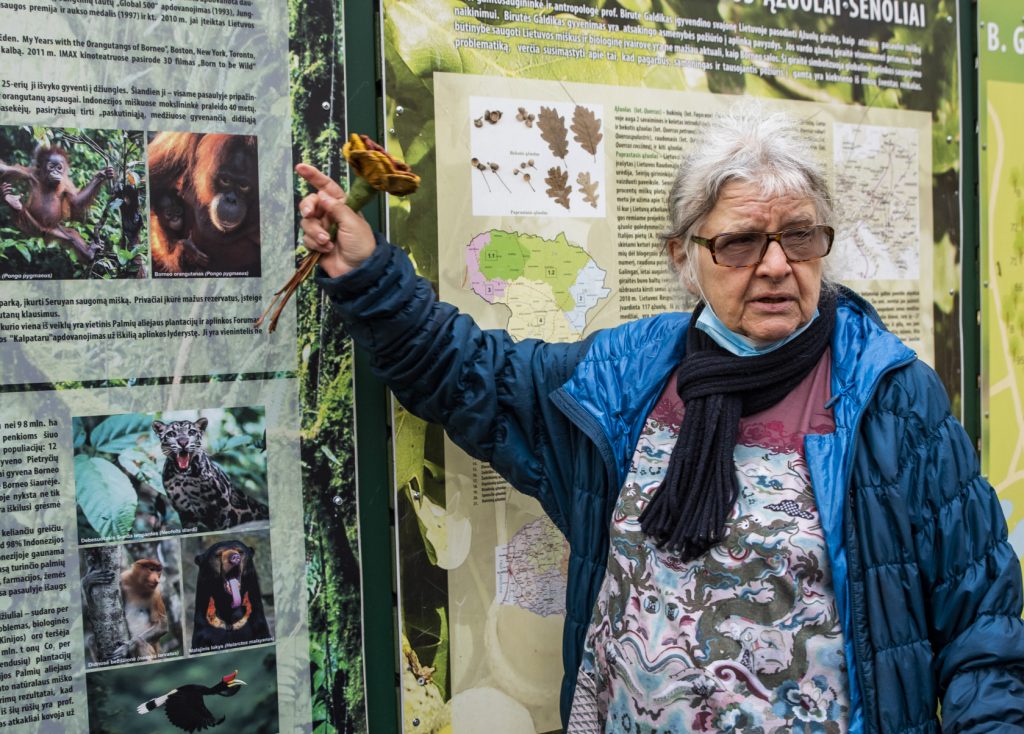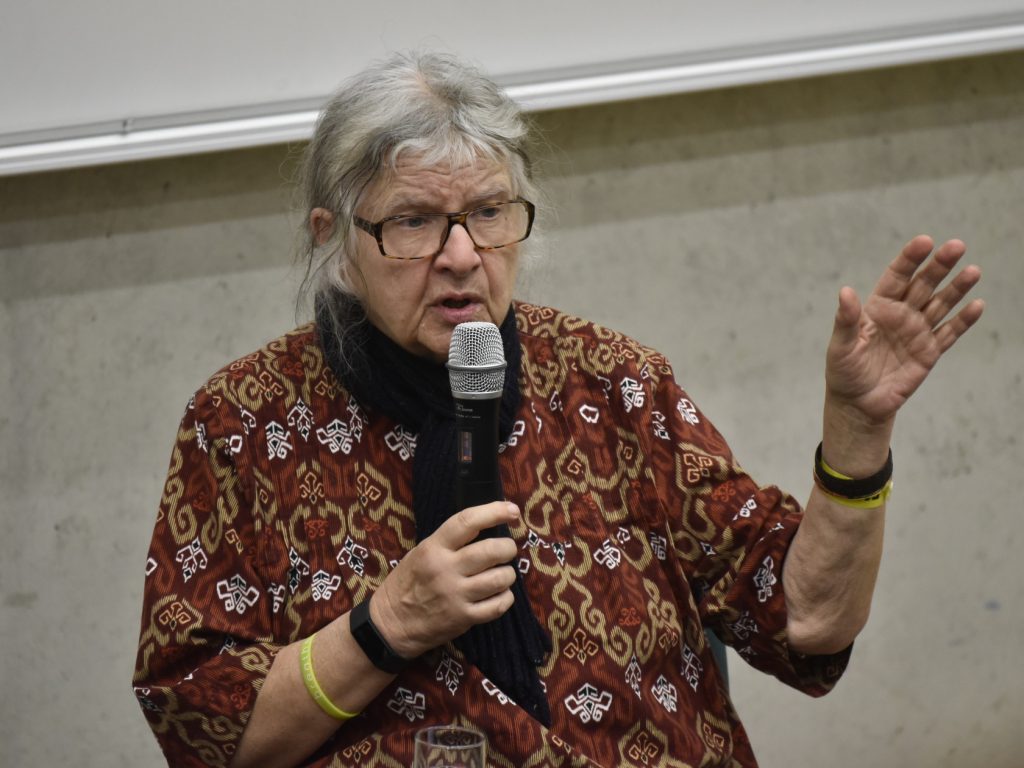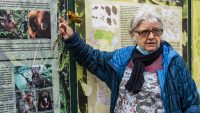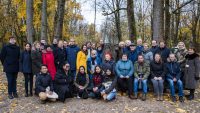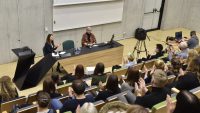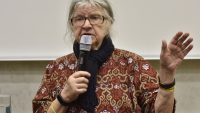Prof. B. Galdikas: Lithuania Has a Deep Historical Bond to Nature

“If we humans do not stop what we are doing now, if we do not change our approach to nature and do not start respecting it, we will get into a lot of trouble. It is evident that we are already in trouble and it is happening before our eyes,” says Professor Birutė Galdikas, a world-renowned anthropologist and Vytautas Magnus University (VMU) Honorary Doctor, who has been working in the field of environment and orangutan conservation for half a century.
On the occasion of the 50th anniversary of her work, Professor Galdikas, a scientist of Lithuanian descent, visited Lithuania. Here she not only gave an open lecture, attended meetings with the VMU community and participated in the World Lithuanian Communities’ forum, but also met with the President of Lithuania Gitanas Nausėda.
Professor Galdikas is known worldwide as the first scientist to start a thorough study of orangutans. Due to her work, the knowledge about the behavior, habitat, and diet of this type of great apes was greatly expanded. In 1971, she established the first orangutan observation centre in Tanjung Puting National Park, located on the Indonesian island of Borneo. Galdikas continues her work in this center to this day.
Professor says that she has been fascinated by nature since childhood. “I think it was my parents that got me so interested in nature. My mother used to take me for a walk in Toronto’s High Park, which is one of the largest city parks in North America, and on weekends we always went to the woods”, the anthropologist recalls. Canada, where Galdikas spent her childhood, is similar to Lithuania with regard to environment as it is also rich in forests.
The gaze of an orangutan penetrates the human soul
Birutė Galdikas says that she became interested in orangutans because these primates resemble humans and seem to have a close relationship with nature. They are also similar to dolphins, who are not only very intelligent, but also have such a deep gaze that it seems as if it could penetrate the human soul. Orangutans have this ability as well as their gaze is almost hypnotic.
“Their eyes have something that makes them look like humans. Also, they are forest dwellers, in fact, in Malay orang hutan means “forest person.” People have something to learn from orangutans, for instance, to be more gentle, to slow down and spend more time in nature,” says Galdikas who has been working with great apes for many years. In fact, some of the orangutans she works with presently she has known since 1971.
Recalling her most important discoveries, professor claims that one of the most significant is related to the relationships between orangutans. At first these primates were considered not very social: they spend much of their time in solitude, climbing up the treetops. However, it turned out that communication and connections with others are also important to them, especially between sisters or between brother and sister.
“We once had to take a wild orangutan into captivity because she was sick and we had to give her medicine. We had to separate her from her child, who we kept in a cage next to her. His older sister, a teenager, followed their mother to our camp. She approached the cage and tried to rescue her younger brother. We did not expect such behaviour from wild orangutans. And when we released them, firstly the brother, the sister immediately descended from the trees and carried him away. As soon as we released the mother, she followed her daughter and took the child back from her. This opened my eyes: although this type of great apes is semi-solitary, it is also characterized by normal family relationships,” says Professor Galdikas recalling one of her surprising discoveries.
Palm oil plantations – biggest threat
The environmentalist remembers experiencing many memorable events during her 50 years of work in Indonesia, but one of the most important memories for her remain the moments when orangutans expressed trust in her and accepted her as one of their own. For instance, one time an orangutan who Galdikas had known for 20 years, sat down next to professor, thus showing that she completely trusted her. Such behaviour is not typical of wild orangutans. On another occasion, a wild orangutan stood up in front of her and began his long call, a series of shouts that last several minutes and could be heard from far away, reaching other orangutans.
According to Birutė Galdikas, the biggest threat to orangutans today remains palm oil plantations, which are created by initially burning tropical rainforests, and thus the habitats of primates and various other animals. Other threats include poaching, illegal logging, mining and fires. For those who wish to protect the environment and orangutans, professor advises not to use palm oil, to protect and plant trees and to recycle paper. And not only for the great apes, but for humankind itself, which is struggling today with the consequences of climate change.
“Disasters are emerging. The global climate is warming, so we have fires, storms, cyclones, melting glaciers, ocean levels are rising, and so on. All of this is the result of human activity. We are already in trouble. Even in Borneo my assistants notice that the weather is getting warmer and the leeches have disappeared due to prolonged droughts. Fires and floods occur constantly. And not just in Indonesia or developing countries – they occur in California and in Australia. We have lost millions of wild animals,” says the conservationist reminding the recent worrying events.
Lithuania’s efforts to protect nature are encouraging
Birutė Galdikas’s parents are Lithuanians who left their homeland to avoid World War II. Through Germany, they emigrated to Canada, where Galdikas spent all of her childhood and youth, and later the family moved to the United States. The scientist claims that she still feels connection to Lithuania: many things here are very familiar to her, mainly because of her parents.
“When I came here, I recognized many things. I recognize them from my parents’ lives, their culture. Besides, I speak Lithuanian, although not that well. In Indonesia, there is no one to communicate with in Lithuanian. I took a genetic test and found out that I’m 99.98 percent Northern European, Lithuanian. So these people, culture, even nature, are familiar to me,” says Galdikas.
Professor was pleased to hear about the efforts to protect the environment in Lithuania, such as the attempt to preserve the Pinewood of Punia. According to her, it is important to take care of your country, and this is especially relevant for Lithuania, which, unfortunately, has preserved twice as less forests when compared to its neighbours Estonia and Latvia.
The scientist herself shows concern for Lithuania’s environment as this year she joined the President Valdas Adamkus’ Prize Committee. The prize is awarded for achievements worthy of public interest and respect as well as for the efforts to protect and restore the natural environment in Lithuania and neighbouring countries, and to ensure the sustainability of resources. After a break, the prize was re-established by the Valdas Adamkus Presidential Library-Museum, acting on the initiative of Vytautas Magnus University and Kaunas City Municipality, together with the Dana Gedvila Fund.
Professor says that Lithuania has a deep historical connection to nature. “When I learned about Lithuanian history and literature in my childhood, I learned that there is a deep connection between Lithuanians and forests. For me, Lithuania represents this certain look back at the pagan religion that Lithuanians have tried so hard to preserve. After all, Lithuanians were the last in Europe to adopt Christianity, right? I believe this nation has a deep connection to nature and I am glad that efforts are being made to revive that connection,” says Professor Galdikas.
A forest is a walk in Godly silence
The anthropologist emphasizes that a forest has a highly beneficial effect on human well-being. “Walking in Godly silence – which is the forest – is an extraordinary experience that refreshes the soul. In Japan, doctors prescribe “forest bathing” (shinrin-yoku in Japanese) as a medical procedure,” Professor Galdikas notes. This is what the Japanese call every visit to the forest – listening to birds chirping, leaves blowing, and observing the nature of the forest.
Birute Galdikas lived in Indonesia for years, so she got to know the people of this large island country closely. Indonesians seem happier to her than Westerners. Although their country does not enjoy great economic prosperity, people here are mostly happy as there is no shortage of opportunities on the islands to farm, grow food for oneself and enjoy nature.
“When I returned to North America after living in Indonesia for a while, my mother told me, “You’ve changed, now you’re smiling all the time.” People of Lithuanian descent, like Finns, don’t constantly smile, they’re more reserved, serious and grim. So that was the first thing my mother noticed,” the anthropologist recalls.
Fifty years ago, Galdikas joined The Trimates, a group dedicated to studying primates. It consisted of two more scientists, namely Jane Goodall and Dian Fossey. The group was brought together by Professor Louis Leakey, a famous paleoanthropologist. Fossey passed away in Rwanda in 1985, fighting for the conservation of mountain gorillas. The remaining two members of The Trimates, both established primatologists, continue their work to this day.
“In a way, Jane Goodall and Dian Fossey were role models for me. These are women who have gone out into the forests and studied primates of their choice: in Jane’s case chimpanzees, and in Dian’s case gorillas. When I went to Southeast Asia, I was planning on doing something like Jane – go out into the forest, learn as much as possible about orangutans and share this information with the rest of the world. We learned from each other at a distance,” says Professor Galdikas.

